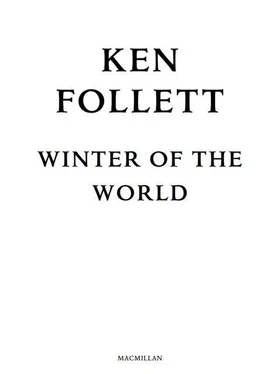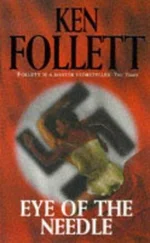Ken Follett - Winter of the World (Century Trilogy 2)
Здесь есть возможность читать онлайн «Ken Follett - Winter of the World (Century Trilogy 2)» весь текст электронной книги совершенно бесплатно (целиком полную версию без сокращений). В некоторых случаях можно слушать аудио, скачать через торрент в формате fb2 и присутствует краткое содержание. Жанр: Старинная литература, на английском языке. Описание произведения, (предисловие) а так же отзывы посетителей доступны на портале библиотеки ЛибКат.
- Название:Winter of the World (Century Trilogy 2)
- Автор:
- Жанр:
- Год:неизвестен
- ISBN:нет данных
- Рейтинг книги:5 / 5. Голосов: 2
-
Избранное:Добавить в избранное
- Отзывы:
-
Ваша оценка:
- 100
- 1
- 2
- 3
- 4
- 5
Winter of the World (Century Trilogy 2): краткое содержание, описание и аннотация
Предлагаем к чтению аннотацию, описание, краткое содержание или предисловие (зависит от того, что написал сам автор книги «Winter of the World (Century Trilogy 2)»). Если вы не нашли необходимую информацию о книге — напишите в комментариях, мы постараемся отыскать её.
Winter of the World (Century Trilogy 2) — читать онлайн бесплатно полную книгу (весь текст) целиком
Ниже представлен текст книги, разбитый по страницам. Система сохранения места последней прочитанной страницы, позволяет с удобством читать онлайн бесплатно книгу «Winter of the World (Century Trilogy 2)», без необходимости каждый раз заново искать на чём Вы остановились. Поставьте закладку, и сможете в любой момент перейти на страницу, на которой закончили чтение.
Интервал:
Закладка:
Macke now realized that he should have done this research before approaching the man. But he had gone ahead without full information. He might have known that was a mistake. In consequence, he had been forced to submit to condescension and sarcasm. He had felt humiliated. But he would get his own back.
He began to go through miscellaneous papers in a dusty cupboard at the back of the room.
The name of von Ulrich did not appear here either, but there was one document missing.
According to the list pinned to the inside of the cupboard door, there should have been a file of 117 pages entitled ‘Vice Establishments’. It sounded like a survey of Berlin’s nightclubs. Macke could guess why it was not here. It must have been in use recently: all the more decadent night spots had been closed down when Hitler became chancellor.
Macke went back upstairs. Kringelein was briefing uniformed police who were to raid the updated addresses Macke had provided of Communists and their allies.
Macke did not hesitate to interrupt his boss. Kringelein was not a Nazi, and would therefore be afraid to reprimand a Storm trooper. Macke said: ‘I’m looking for the Vice Establishments file.’
Kringelein looked annoyed but made no protest. ‘On the side table,’ he said. ‘Help yourself.’
Macke took the file and returned to his own room.
The survey was five years old. It detailed the clubs then in existence and stated what activities went on in them: gambling, indecent displays, prostitution, sale of drugs, homosexuality and other depravities. The file named owners and investors, club members and employees. Macke patiently read each entry: perhaps Robert von Ulrich was a drug addict or a user of whores.
Berlin was famous for its homosexual clubs. Macke ploughed through the dreary entry on the Pink Slipper, where men danced with men and the floor show featured transvestite singers. Sometimes, he thought, his work was disgusting.
He ran his finger down the list of members, and found Robert von Ulrich.
He gave a sigh of satisfaction.
Looking farther down, he saw the name of Jörg Schleicher.
‘Well, well,’ he said. ‘Let’s see how sarcastic you are now.’
(iv)
The next time Lloyd saw Walter and Maud he found them angrier – and more scared.
It was the following Saturday, 4 March, the day before the election. Lloyd and Ethel were planning to attend a Social Democratic Party rally organized by Walter, and they went to the von Ulrichs’ home in Mitte for lunch beforehand.
It was a nineteenth-century house with spacious rooms and large windows, though much of the furniture was worn. The lunch was plain, pork chops with potatoes and cabbage, but there was good wine with it. Walter and Maud talked as if they were poor, and no doubt they were living more simply than their parents had but, all the same, they were not going hungry.
However they were frightened.
But had persuaded Germany’s aging President, Paul von Hindenburg, to approve the Reichstag Fire Decree, which gave the Nazis authority for what they were already doing, beating and torturing their political opponents. ‘Twenty thousand people have been arrested since Monday night!’ Walter said, his voice shaking. ‘Not just Communists, but people the Nazis call “Communist sympathizers”.’
‘Which means anyone they dislike,’ said Maud.
Ethel said: ‘How can there be a democratic election now?’
‘We must do our best,’ Walter said. ‘If we don’t campaign, it will only help the Nazis.’
Lloyd said impatiently: ‘When will you stop accepting this and start to fight back? Do you still believe it would be wrong to meet violence with violence?’
‘Absolutely,’ said Maud. ‘Peaceful resistance is our only hope.’
Walter said: ‘The Social Democratic Party has a paramilitary wing, the Reichsbanner, but it’s weak. A small group of Social Democrats proposed a violent response to the Nazis, but they were outvoted.’
Maud said: ‘Remember, Lloyd, the Nazis have the police and the army on their side.’
Walter looked at his pocket watch. ‘We must get going.’
Maud said suddenly: ‘Walter, why don’t you cancel?’
He stared at her in surprise. ‘Seven hundred tickets have been sold.’
‘Oh, to blazes with the tickets,’ Maud said. ‘I’m worried about you. ’
‘Don’t worry. Seats have been carefully allocated, so there should be no troublemakers in the hall.’
Lloyd was not sure that Walter was as confident as he pretended.
Walter went on: ‘Anyway, I cannot let down people who are still willing to come to a democratic political meeting. They are all the hope that remains to us.’
‘You’re right,’ Maud said. She looked at Ethel. ‘Perhaps you and Lloyd should stay home. It’s dangerous, no matter what Walter says; and this isn’t your country, after all.’
‘Socialism is international,’ Ethel said stoutly. ‘Like your husband, I appreciate your concern, but I’m here to witness German politics first hand, and I’m not going to miss this.’
‘Well, the children can’t go,’ Maud said.
Erik said: ‘I don’t even want to go.’
Carla looked disappointed but said nothing.
Walter, Maud, Ethel and Lloyd got into Walter’s little car. Lloyd was nervous but excited too. He was getting a perspective on politics superior to anything his friends back home had. And if there was going to be a fight, he was not afraid.
They drove east, crossing Alexander Platz, into a neighbourhood of poor houses and small shops, some of which had signs in Hebrew letters. The Social Democratic Party was working-class but, like the British Labour Party, it had a few affluent supporters. Walter von Ulrich was in a small upper-class minority.
The car pulled up outside a marquee that said: ‘People’s Theatre’. A line had already formed outside. Walter crossed the pavement to the door, waving to the waiting crowd, who cheered. Lloyd and the others followed him inside.
Walter shook hands with a solemn young man of about eighteen. ‘This is Wilhelm Frunze, secretary of the local branch of our party.’ Frunze was one of those boys who looked as if they had been born middle-aged. He wore a blazer with buttoned pockets that had been fashionable ten years ago.
Frunze showed Walter how the theatre doors could be barred from the inside. ‘When the audience is seated, we will lock up, so that no troublemakers can get in,’ he said.
‘Very good,’ said Walter. ‘Well done.’
Frunze ushered them into the auditorium. Walter went up on stage and greeted some other candidates who were already there. The public began to come in and take their seats. Frunze showed Maud, Ethel and Lloyd to reserved places in the front row.
Two boys approached. The younger, who looked about fourteen but was taller than Lloyd, greeted Maud with careful good manners and made a little bow. Maud turned to Ethel and said: ‘This is Werner Franck, the son of my friend Monika.’ Then she said to Werner: ‘Does your father know you’re here?’
‘Yes – he said I should find out about social democracy myself.’
‘He’s broad-minded, for a Nazi.’
Lloyd thought this was a rather tough line to take with a fourteen-year-old, but Werner was a match for her. ‘My father doesn’t really believe in Nazism, but he thinks Hitler is good for German business.’
Wilhelm Frunze said indignantly: ‘How can it be good for business to throw thousands of people into jail? Apart from the injustice, they can’t work!’
Werner said: ‘I agree with you. And yet Hitler’s crackdown is popular.’
‘People think they’re being saved from a Bolshevik revolution,’ Frunze said. ‘The Nazi press has them convinced that the Communists were about to launch a campaign of murder, arson and poison in every town and village.’
Читать дальшеИнтервал:
Закладка:
Похожие книги на «Winter of the World (Century Trilogy 2)»
Представляем Вашему вниманию похожие книги на «Winter of the World (Century Trilogy 2)» списком для выбора. Мы отобрали схожую по названию и смыслу литературу в надежде предоставить читателям больше вариантов отыскать новые, интересные, ещё непрочитанные произведения.
Обсуждение, отзывы о книге «Winter of the World (Century Trilogy 2)» и просто собственные мнения читателей. Оставьте ваши комментарии, напишите, что Вы думаете о произведении, его смысле или главных героях. Укажите что конкретно понравилось, а что нет, и почему Вы так считаете.












